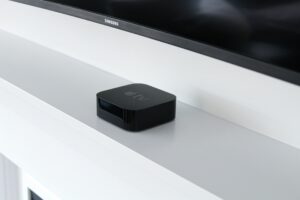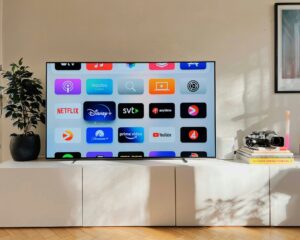Smart TVs have transformed how people consume entertainment. They interact with technology and use their TV sets for purposes beyond traditional viewing. Smart TV apps power this shift. They offer streaming services, gaming, and productivity tools. For developers, learning to build smart TV applications is a valuable skill. Whether you’re a solo developer or part of a smart TV app development company.
This guide breaks down the smart TV app development. We break the process into simple steps — from understanding platforms to writing code.
Understanding Smart TV Platforms
Smart TVs run on various platforms. And it’s better to choose the platform based on your audience and app goals.
| Platform | Description | Examples |
| Android TV | Built on Android OS, supports Google Play TV apps | Sony, TCL, Xiaomi |
| Roku | Proprietary platform with easy-to-use SDK | Roku streaming devices |
| Samsung Tizen | Proprietary OS for Samsung Smart TVs | Samsung Smart TVs |
| LG WebOS | LG’s proprietary operating system | LG Smart TVs |
Key Factors to Consider:
- Target Market: Android TV app development is ideal if your audience uses Sony or TCL Smart TVs, while Samsung Tizen caters to Samsung TV owners.
- Development Ease: Platforms like Android TV offer more accessible tools and libraries.
- Assistance: If you're unsure where to start, consult a smart TV app development company for guidance.
Prerequisites for Development
Before you begin building your app, prepare the necessary tools and skills:
- Programming Knowledge:
- Familiarity with Python, JavaScript, or Java.
- Knowledge of app architecture, APIs, and backend development.
- Development Tools:
- For Android TV: Android Studio, Android SDK, and device emulators.
- For Roku: BrightScript and Roku Development Kit.
- For Other Platforms: Specific SDKs like Tizen Studio or LG WebOS SDK.
- Setup Steps for Android TV App Development:
- Install Android Studio and configure the Android SDK.
- Test on real Smart TVs or emulators to ensure smooth remote control navigation.
Designing the User Interface
Design plays a critical role in user engagement. Smart TV apps must accommodate large screens, remote control navigation, and accessibility.
Design Principles for Smart TV Apps:
- Focus on Simplicity. Use a minimalist layout with large fonts and easy-to-read elements.
- Navigation Optimization. Ensure seamless navigation using a remote control or voice commands.
- Accessibility. Include high-contrast themes and support for multiple languages.
Example Features to Include:
- Home Screen Layout:
- Large, clickable tiles for categories like “Movies,” “TV Shows,” and “Settings.”
- Search Functionality:
- Integrate voice input for easier searches.
Using prototyping tools like Figma or Adobe XD allows you to visualize your design. You can refine it before development.
Building the Application
Now it’s time to build smart functionality into your TV app. Development typically includes creating the app’s user interface, connecting to a backend system, and integrating APIs.
Using Python in Smart TV App Development:
Python isn’t usually the go-to language for Smart TV apps. However, it plays a significant role in backend development and data processing.
- Backend Development. Frameworks like Django or Flask manage server-side logic, such as user authentication and data handling.
- Data Handling. Libraries like Pandas or NumPy efficiently process large datasets, like user viewing habits.
- Machine Learning. TensorFlow or PyTorch enables personalized recommendations.
Developing for Android TV Using Python
For Android TV app development, Python can complement the process by managing backend tasks or creating simple apps with frameworks like Kivy.
Testing and Debugging
Thorough testing ensures a smooth user experience across different devices.
- Testing on Real Devices:
- Use a physical Smart TV or streaming device for the most accurate results.
- Test navigation to ensure compatibility with remote control input.
- Debugging Tools:
- Android Studio for Android TV apps.
- Roku Debugger for apps developed on the Roku platform.
Test the following:
- Performance: Does the app lag or freeze during navigation?
- Functionality: Are all features, such as search and playback, working as intended?
Deploying the App
Once the app is built and tested, it’s time to deploy it. Each platform has its own submission process:
| Platform | Deployment Process |
| Android TV | Submit your app to Google Play TV with appropriate metadata, screenshots, and descriptions. |
| Samsung Tizen | Upload to the Samsung App Store. |
| LG WebOS | Submit to the LG Content Store. |
Best Practices for Deployment:
- Follow platform-specific guidelines to avoid rejection.
- Ensure your app is optimized for remote control usability.
Monetizing and Marketing Your App
A well-designed smart TV app can generate revenue through various monetization strategies:
- Monetization Options:
- Advertisements: Use ad networks compatible with Google Play TV.
- Subscriptions: Offer premium content or features.
- In-App Purchases: Allow users to unlock additional content.
- Marketing Strategies:
- Promote your app on social media and targeted online communities.
- Collaborate with a smart TV app development company to reach a broader audience.
- Utilize app store optimization techniques to improve discoverability.
Conclusion
Smart TV apps are an exciting frontier for developers looking to explore large-screen entertainment and utility solutions. From Android TV app development to creating apps for platforms like Roku or Tizen, the steps outlined above provide a clear roadmap. By integrating tools like Python for backend development and focusing on seamless remote control navigation, you can build smart, engaging apps that captivate users.
Get started today, and consider partnering with a smart TV app development company to accelerate your progress. With the right tools and strategies, your TV apps can make a lasting impact!


